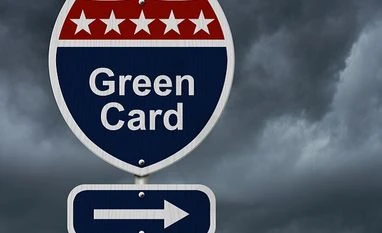India's love affair with the US and the American dream continues unabated, with Indians being the second largest group to have obtained US citizenship during 2016.
The Times of India reported on Friday that close to 46,100 Indians obtained US citizenship during 2016. In fact, according to the report, they were the second largest group behind Mexicans to obtain citizenship.
Citing recent data released by the US Department of Homeland Security, the national daily reported that Indians made up six per cent of the total 753,000 individuals who received citizenship during the US financial year 2016 (October 1, 2015, to September 30, 2016).
However, the report added that a slight year-on-year decline in the number of citizenships conferred was already becoming visible and that immigration from Mexico was showing negative growth. This decline comes at a time when, according to the report, applicants have faced extreme vetting and there has been an increase in denials for reasons dating back many years. At the same time, the report added, the turmoil surrounding the US' work visa related policies has led to a significant increase in the number of people applying for citizenship.
In fact, citing the available data, the report said that the financial year 2016 saw a 24 per cent rise in applications, which stood at 972,000, for US citizenship over the previous year. The report contrasted this with the fact that the number of applications in 2015 was only one per cent higher than the number in 2014. Further, the uncertainty surrounding US visa policies and the Trump administration's focus on providing more jobs to American citizens has led to many green card-holders applying to naturalisation, the report added.
With Donald Trump's ascension to the American presidency, Indian-Americans have raised several issues regarding visa and immigration policies. Further, they also have new worries to contend with.
"We are fighting hard for Merit Based immigration, no more Democrat Lottery Systems. We must get MUCH tougher (and smarter)," Trump tweeted.
Currently, the US follows what is called the "family-based immigration" policy, which critics call "chain migration", according to the Voice of America (VoA). The present system is based on sponsorship and an American citizen or green card holder is allowed to sponsor relatives hailing from his or her home country to move to the US, explains VoA.
In the case of spouses and minor children, who qualify as immediate relatives, they do not need to wait for a visa number, the report adds. Further, there's no quota for these relatives and an American citizen can simply file a petition.
However, the report adds, in the case of brothers, sisters, and adult children, the process can be long and difficult.
If Trump does away with the current system, it will be the families of immigrants who will be affected the most.
However, certain proposed changes in policy could also benefit some Indians. In August, Trump had announced his support for a legislation that would cut in half the number of legal immigrants allowed into the US while moving to a "merit-based" system favouring English-speaking skilled workers for residency cards. As reported earlier, if passed by the Congress and signed into law, the legislation, titled the Reforming American Immigration for Strong Employment (RAISE) Act, could
benefit highly-educated and technology professionals from countries like India.
The RAISE Act would scrap the current lottery system to get into the US and instead institute a points-based system for earning a Green Card. Factors that would be taken into account include English language skills, education, high-paying job offers, and age.
Further, as reported in October this year, a group of more than 100 Indian IT professionals on H-1B visas
knocked on the doors of US lawmakers to get the country-specific quotas for permanent residency removed, saying the limitation resulted in massive green card backlogs for them.
Every year, the US Citizenship and Immigration Services (USCIS) receives about 100,000 green card applications from highly-skilled Indian applicants. However, less than 10,000 Indians receive the green card, which is a step closer to citizenship. This number keeps on increasing every year.
"We are all stuck in this 70 years backlog. Most of us came to this country about 10 years ago," said Houston-based Harshit Chatur, a key volunteer of the recently formed 'Skilled Immigrants In America'.
Established a few months ago by some Indian technology professionals who have been agonisingly waiting for their green card, 'Skilled Immigrants In America' now claims to have more than 150,000 members and chapters in 25 states of the US.
Unlock 30+ premium stories daily hand-picked by our editors, across devices on browser and app.
Pick your 5 favourite companies, get a daily email with all news updates on them.
Full access to our intuitive epaper - clip, save, share articles from any device; newspaper archives from 2006.
Preferential invites to Business Standard events.
Curated newsletters on markets, personal finance, policy & politics, start-ups, technology, and more.
)